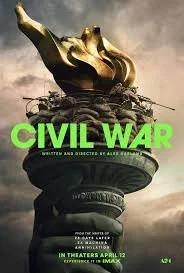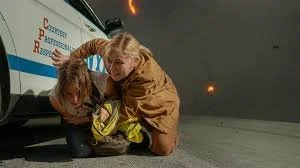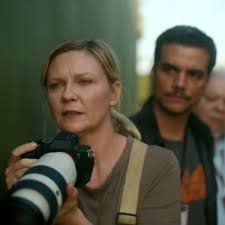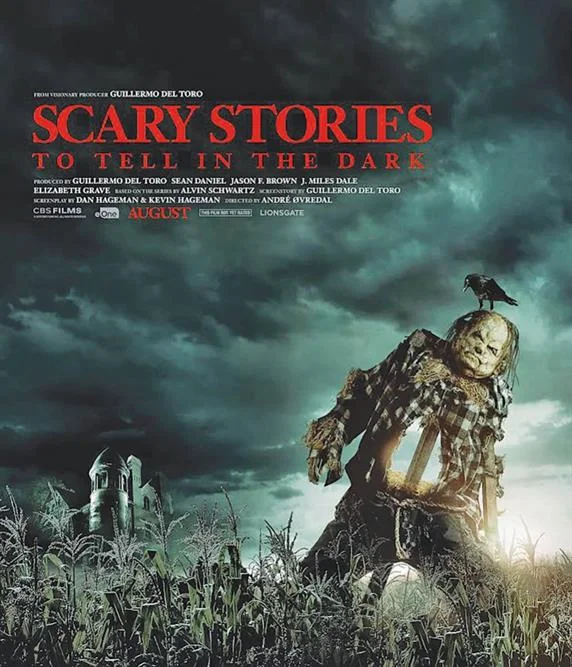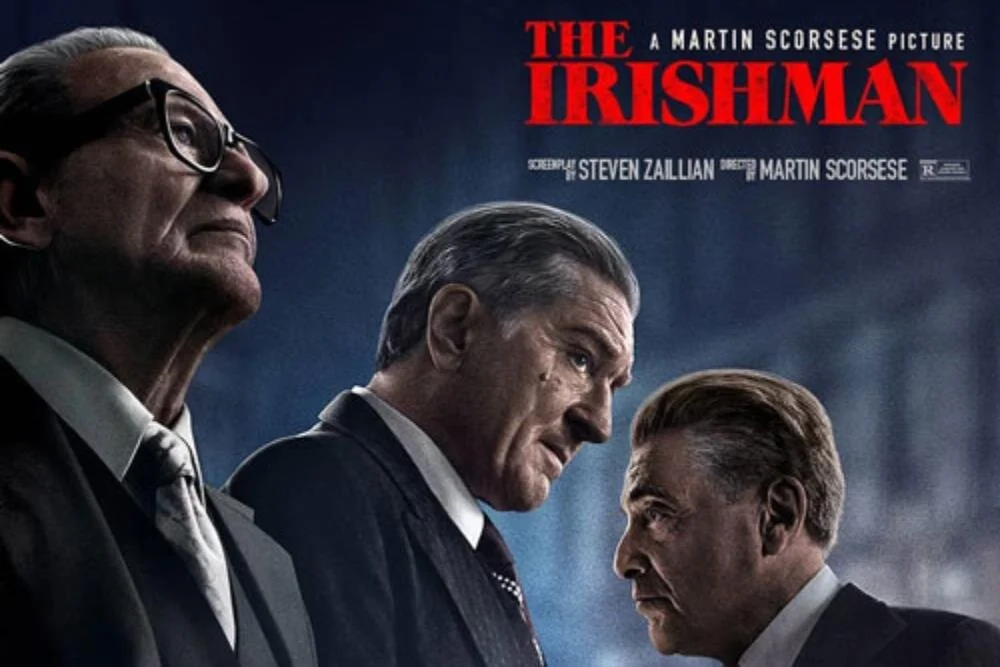Civil War
A supremely promising premise is undercut by lackluster dialogue and boring characters. 6.2/10
Full Disclosure: I’ve been a huge fan of writer/director Alex Garland’s work since 2014’s Ex Machina. Ten years on, that film still stands as my personal favorite science fiction film of the 21st century so far. I wasn’t expecting a masterpiece when I strolled into the theater for his latest film, Civil War, but I was certainly expecting more than I got.
Brace yourself. I’m going to be pretty hard on Civil War throughout this article. It’s not out of malice or disdain. Rather, it’s like the teacher that sees so much potential in a pupil, but said student fails to apply their inherent talents. Granted, Alex Garland knows more about film and filmmaking than I ever will, but that just makes me want to hold him to a higher standard. Both Ex Machina and Annihilation were amazing original sci-fi films that left me pondering the nature of humanity when the end credits rolled. When the credits rolled for Civil War, it left me pondering how such a skilled storyteller dropped the ball. The film has its merits, and I’ll get into those (we try to be as fair as possible here at UFR), but the disappointments outweighed the positives here.
Kirsten Dunst and Cailee Spaeny both put in admirable efforts, but you can only do so much with shit dialogue at your disposal.
Civil War is set in the not-so-distant future where… wait for it… a civil war rages in the United States of America (part deux). While the nation is split into four warring factions, the film only focuses on two: The loyalist states which are, unsurprisingly, loyal to the current regime, and the Western Forces, comprised solely of Texas and California. (Side note: the fact that California and Texas are on the same side in this war goes to show that Garland wants to avoid any modern political comparisons. There is no reality where those two states agree on the color of the sky, let alone engage in open rebellion alongside one another.) That’s about all we’re given as far as backstory. The story doesn’t revolve around the players in the war. Rather, it revolves around an ostensibly neutral group of journalists covering the war.
Kirsten Dunst plays a seasoned, hard-hearted photo journalist who has seen it all. She’s been in every war-torn province worldwide for decades. Her cohort, played by Wagner Moira of Narcos: Mexico fame, is the on-camera face of the operation. Their goal: traverse a war-torn nation to get from New York City to Washington D.C. to interview the President of the United States, who is serving a third term and is on his back heels as far as the war effort is concerned. Along for the ride (against Dunst’s wishes) are an old veteran journalist played by Stephen McKinley Henderson and an aspiring young photo journalist played by Cailee Spaeny. Road trip!!!
Kirsten, Wagner, and Stephen shooting a harrowing scene of carnage.
Spoilers Ahead
I left the theater feeling silent and empty, and not in a good way. I feel like this film had nothing to say; no overlying message except that “war sucks.” Garland doesn’t give us a reason for the titular civil war. He doesn’t come down on either side of the conflict. It isn’t pro or anti-MAGA, nor is it pro or anti-woke. While that choice is admirable and interesting, it also seems like Garland is trying to have his cake and eat it too. America is at war with itself, but we’re left to wonder why. If it was a better script, I’d be thrilled with the choice to leave the cause of the war to the viewer’s imagination. Unfortunately, it seems like Civil War was a few drafts short of a finished product.
The crux of the film, in my opinion, comes down to this: Is war journalism exploitative, or a necessity to show the taxpayers the horrors of the combat they’re bankrolling? As with most deep biting questions, the answer lies somewhere in the middle. Are the journalists in the film acting out of pure altruism? That’s a resounding “fuck no!” Are they acting out of their own self-interests and a need to feel important? That’s more of a “well, yeah… kinda.” The problem is that all of the main characters are unlikeable, and, even more egregiously, unrelatable.
Wagner Moura does his damndest to inject some real emotion into this scene, but it just falls flat.
Since the characters are so unrelatable and distant, I didn’t feel a damn thing when anyone died. In fact, the only character death that left me a little forlorn was Jesse Plemons. While he was a piece of shit and the closest thing we had to an out-and-out “antagonist”, he was fucking incredible. I don’t know who his agent/manager is, but Plemons has never been in any project where he hasn’t shone bright. He stole the show in this film. (He also happens to be married to Kirsten Dunst, but you’ll find no accusations of nepotism on this site.)
I think the weakest part of this film was the overall dialogue. It was clunky at best, and absolute hackery at worst. It just didn’t seem realistic at any point, and it’s why I had trouble connecting to any of the characters in an emotional sense. It felt like, “Okay, this is what this character would say to this other character at this point in the film” without giving any motivation or method to said characters. It all felt very forced and wooden.
Jesse Plemons, you are the fucking man!
Alright, I’ve shat on this film enough. Time to give flowers to the good stuff. The sound was fucking incredible! This is an early frontrunner for the Best Sound category at next year’s Oscars. I’m sure it was enhanced by the fact that I saw this in Dolby, but the sheer concussive power of every gunshot made me feel like I was right there with the soldiers and journalists. I’ve never heard anything like it.
The climactic battle sequence as the Western Forces took over D.C. was unparalleled in cinema. Not since Saving Private Ryan have I been more engrossed in a cinematic battle. It was so gritty, so realistic, and so chaotic that I was on the edge of my reclining AMC theater seat! It was truly the highlight of the film, and the saving grace that stopped me from scoffing at the film entirely. (Although, as I was watching that sequence, I couldn’t help but think to myself that this would’ve been a better video game than a movie.)
So Kirsten Dunst’s character sacrifices herself by taking a bullet for her young protege. I feel nothing. The Western Forces summarily execute the President of the United States in the Oval Office, and we all live happily ever after. Yay?
RIP President what’s his face.
5 Quick Hits
What happened to Lee’s assertion that Jessie would not come with them one step over enemy lines in Charlottesville? Lee was pretty fucking adamant, then kinda forgot about it?
This is indie studio A24’s most expensive film to date, with a price tag of around $50 million. It definitely shows in the climax, and I’m pretty sure the box office will recoup the budget, but this was a big risk.
Speaking of indie studios, at what point does an indie studio cease to be labelled as “indie”? A24 is one of the most celebrated studios in the world now. Just asking…
The soundtrack was really on point in this film. A less obvious standout moment for me was the juxtaposition of traditional Christmas tunes with a sniper battle. Great choice!
Our senior military consultant, retired veteran First Sergeant Thomas Giordano, said that the combat and tactics were extremely realistic in relation to other war films.
